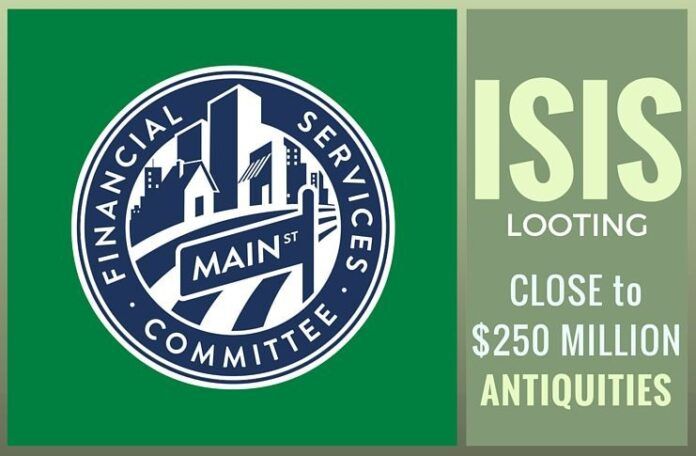
Terrorist group ISIS is Looting and Destroying Cultural Artifacts on ‘Unprecedented Scale’
The Task Force to Research Terror Money held a hearing on Tuesday to examine the top approaches to counter sales and the plunder of precious national antiquities. Looting is happening on an “unprecedented scale” and some estimate that ISIS could be making around $200-million annually from illicit trade in antiquities and archaeological treasures.
“The United States must do its portion in lowering the demand for these inspired and ethnic artifacts by taking another look at consumer research and improving coordination with our overseas partners. This is a revenue stream exploited by illegal actors around the globe and it can’t continue unabated,” said Task Force Chairman Michael Fitzpatrick (R-PA).
Key Takeaways from the Hearing:
-
There are some 4,500 archeological sites located in ISIS territory that are at risk – vulnerable to looting, destruction, or both.
-
ISIS has derived significant illicit revenues from the plunder and destruction of cultural sites and artifacts in Syria and Iraq – what some have called “the largest challenge for the international heritage community since World War II.”
Topline Quotes from Witnesses:
“According to the United Nations Office on Drugs and Crime, 2%-5% of the global GDP takes the form of laundered money – $800 million to $2 trillion. In the art market or art industry a staggering amount of this criminal activity takes place – where ‘dirty’ money obtained from illegal activity is laundered into clean currency and where trade-based assets are directly laundered as a more complex and growing form of international money laundering.” – Lawrence M. Shindell, Executive Chairman, ARIS Title Insurance Corporation
“Our history defines us. Works of art, monuments, and other cultural treasures belong to all of us, regardless of the country or museum in which they reside. They are a gift to us from previous generations that serve as a source of learning, enjoyment, and inspiration. These gifts come with an inherent responsibility to do everything prudently possible to preserve them for future generations. No one person had a better understanding of that responsibility than the founder of the Monuments Men, Lt. Commander George Stout. In making his case for cultural preservation officers to President Roosevelt in 1943, Stout said it clearly and dispassionately: ‘To safeguard these things will show respect for the beliefs and customs of all men and will bear witness that these things belong not only to a particular people but also to the heritage of mankind. To safeguard these things is part of the responsibility that lies on the governments of the United Nations.’” –Robert Edsel, Founder and Chairman, Monuments Men Foundation for the Preservation of Art.
“ISIL earns income at several points of intersection with the stream through which artifacts move from their initial looting to their sale and ultimate smuggling out of Syria. Early reports in the summer of 2014 from Syrians in Syria revealed that ISIL takes a financial cut from the looting of these sites by charging a 20% tax on the looters and takes an additional cut by taxing the smugglers who move the artifacts across the Syrian border. Information gained from a raid carried out by U.S. Special Forces on the compound of Abu Sayyaf, informally described as the chief financial officer of ISIL, in the spring of 2015 indicates that ISIL tightly controls and organizes the looting of sites and the smuggling of antiquities.” – Dr. Patty Gerstenblith, U.S. Committee of the Blue Shield.
“Although the earnings from antiquities are less robust than those from oil revenue, looting represents a stable, less capital-intensive revenue stream. With plenty of local knowledge and no shortage of civilians to dig for artifacts, the trade is rampant in the region. Even in non-IS-held territory, many unemployed locals excavate and sell antiquities to earn income.” –Yaya Fanusie, Director of Analysis, Center on Sanctions and Illicit Finance, FDD.
“ISIS is likely the wealthiest radical terrorist organization in contemporary history, with widely diversified sources of income. Stopping the highly lucrative illicit trade in antiquities is imperative not only because it is a major source of income for terrorist organizations like ISIS, but also due to the irreparable damage it is causing to Syria’s cultural heritage.” –Amr Al-Azm, Associate Professor of Middle East History and Anthropology ad Shawnee State University in Ohio.
- Supreme Court rejects plea to tally all VVPAT slips with EVM votes; says ‘no going back to paper ballot’ - April 26, 2024
- US report citing human rights violations is deeply biased: India - April 25, 2024
- Kotak Mahindra Bank shares tank 13%. Market Cap erodes by Rs.37,721 cr post-RBI action - April 25, 2024










